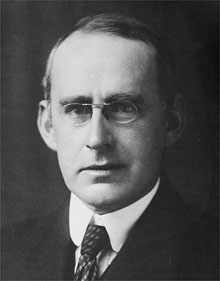
Sir Arthur Eddington, from the George Grantham Bain Collection (Library of Congress)
Eddington
Sir Arthur Stanley Eddington (28 December 1882 – 22 November 1944) was a Cambridge cosmologist who played a key role in establishing Einstein’s General Theory of Relativity (GTR). His observations of the total solar eclipse at Principe in 1919, and specifically of deflection of the star field in the neighbourhood of the Sun, confirmed the prediction of GTR that light should be bent by gravity. It was an early example of gravitational lensing . He helped establish the theory in other ways: his book The Mathematical Theory of Relativity was acclaimed by Einstein as the finest book on GTR in English or any other language, and throughout the ‘20s and ‘30s he gave popular expositions of GTR and quantum theory. He was the originator of influential ideas in the theory of stellar evolution. He was also an early advocate of Lemaitre’s Big Bang cosmology, which he encountered whilst pursuing the question of stability of Einstein’s steady state cosmology, as secured by Einstein with the introduction of the cosmological constant on the left-hand side of the field equations of GTR.
From the 1920s and until his death Eddington became progressively more involved in what he called ‘fundamental theory’, much of it based on speculations as to the values of the various dimensionless numbers that can be defined from the fundamental constants of physics. His sought a unification of quantum theory, GTR, and cosmology, but increasingly turned to what appeared to be numerology. His vacillations on the value of the fine-structure constant, that he first posulated should be precisely equal to 1/136 but later amended (in line with measurement) to the number 1/137, brought him disrepute among physicists. But other of his speculations were more in keeping with grand unification theories today, including the use of algebraic structures, in particular Clifford algebras, and higher-dimensional spaces. His writings on these topics were published posthumously in Fundamental Theory (1946).
Eddington also wrote in philosophy of science. In his book The Nature of the Physical World he argued that materialism had been conclusively overthrown with the development of relativity and, even more importantly, quantum physics, and that the only viable alternative was a form of idealism. In echoes of Spinoza, he argued that the world should be conceived as made of ‘mind-stuff’, that consciousness is continuous with subconsciousness, and that beyond that lies ‘something indefinite but continuous with our mental nature’ (p.281). He argued that we can have no conception of that which is not conscious or continuous with conscious substance, for all that we can ever know is of a mental nature.
Eddington was born in born in Kendal, Cumbria, and attended the University of Manchester, where he obtained a BSc in physics in 1902. He was then admitted to Trinity College Cambridge, where he became the first-ever 2nd year student to be placed as senior wrangler. He became an assistant to the Astronomer Royale at Greenwich in 1906, eventually returning to Cambridge first as Fellow of Trinity College and then, in 1912, as Plumian Professor of Astronomy and Experimental Philosophy.
Links
Online Books by Arthur Eddington >
